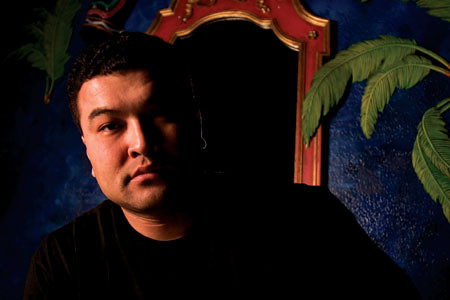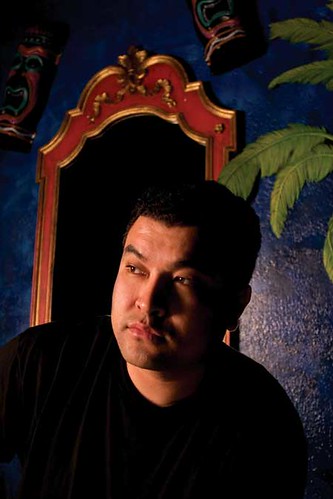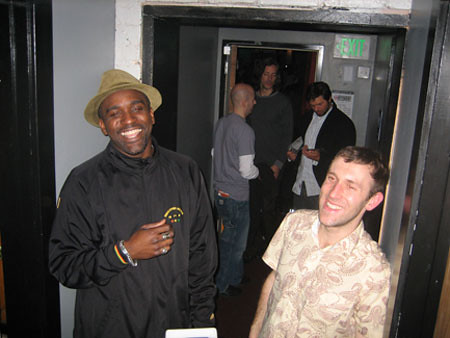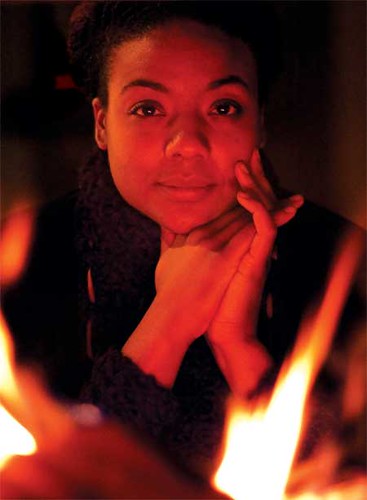Lyrics Born: Fighting Without Martyrs

Story by Mike Conway
Flix by Bayeté Ross-Smith
Lyrics Born is a straight-up dude. When conversating with this acclaimed emcee, what you see in him, you get from him—like a gallon of pure H2O; he carries very few abstractions. Forget for a minute that he’s of the Asian diaspora, which is something the media normally fails to do. Media portrayals of Asians run a thin gamut (more on that later). Regardless, Lyrics is one of the most legit cats I’ve met among all “diaspores.”
Like leaches, characterizations flock toward the slightest blood-drop from the Far East. I even caught myself expounding a geography lesson to Tom Shimura , a.k.a. Lyrics Born, about how Asia is everything east of Turkey, until LB interrupted with, “and damn near all of Daly City.” Like I said, he’s real like that.
Reality is lost many times on an entertainer’s appeal. It slowly separates performers from the general population. We see them first as friends, then as part fetish and part obsession, which are all very distracting reactions to our tastes. With his loungey baritone, LB defuses any misconceptions about his appeal, focusing rather on what is at hand—sight, sound, scents, as well as tastes:
When I look out from the stage onto the audience, I definitely see like a really broad range of people. I see a lot of women, which is not typical of most hip-hop shows [chuckles], a lot of women of color; I see a lot of people of color across the board. You know the more records that sell and the more popular the music gets, I just see that if the area has that kind of diversity, those people are definitely checking us out.
I’ve spoken to Lyrics a couple of times, and I don’t recall his voice ever being hoarse. For such a loquacious rapper, this dude’s got an unfailing vocal capability. Lyrics really started to roll when he and label-mate Lateef dropped their debut LP Latyrx in 1996. Their hit “Say That” is one of the sharpest joints of the ‘90s. I was seriously disillusioned with hip-hop back then, as it seemed the genre traded in its cajones and uhurus for a grip of glossy crap. Latyrx brought me right back with a simple punchline by Lyrics Born: “Suckers steer clear of me like feminists do car shows.”
LB now rocks crowds with wife Joyo Velarde and a live band. He’s rapped with the mac-daddies of all barbershop sextets, Jurassic 5, with Souls of Mischief, KRS ONE and E40. No matter what the configuration, his style always comes through, cordial and fresh. Even so, just like with white emcees, people try to tie him strictly to his ethnicity, and at times he’s tagged as “the Asian rapper.” It’s not so much racist as it is a rarity.

During our interview, he and I inevitably had to talk about the “race card.” To most of the mass media, Asian presence is as scarce as a nice set of gams in Mecca during Ramadan. “I mean I got satellite,” Lyrics adds, “and I can watch that shit for 24 hours, and I bet you I see two or three Asians. And we’re talking 500 channels now man... But we’re here; we’ve been here for a long time.”
Many Pacific-Rim literati concur with Lyrics Born. In her book I Have Chosen to Stay and Fight, spoken word performer Margaret Cho says when you actually do see Asians, they’re this small margin of stereotypes: fiery Jet Li ass-kickers, the math wizes, workaholic liquor store heads (a.k.a. crime victims), and lone field reporters narrating over drab, canned footage. Plotlines restrict them to exotic intrigues, like smuggling organs and fading the feds with help from ancient curses. This may be a far different order than sambos, yes. But like any stereotype, these roles place Asian characters just as far from fucking REALITY.
“The industry has a long way to go,” says Lyrics. “We’re gonna have to start our own shit and blow-up independently because no artist-&-repertoire entity is gonna say, ‘we need to go out there and find ourselves some Asian rappers.’”
LB’s already way ahead of them. Formerly Asia Born, he made the switch to “Lyrics” near the same point as his label Quannum changed-over from “Solesides.” LB made the personal transition from a focus on where he was from to an emphasis on where he’s at right now. And though he seems to have lost a little weight, LB is snow-balling a couple sizes above L, fame-wise. It couldn’t happen to a more deserving, persevering cat.
Though his appeal is rife with anomalies, it attests both to the flexibility of his sound and the transcendent honesty of his words. But don’t trip on the appeal. Buy the fucking shit and rock it like it’s hot.






